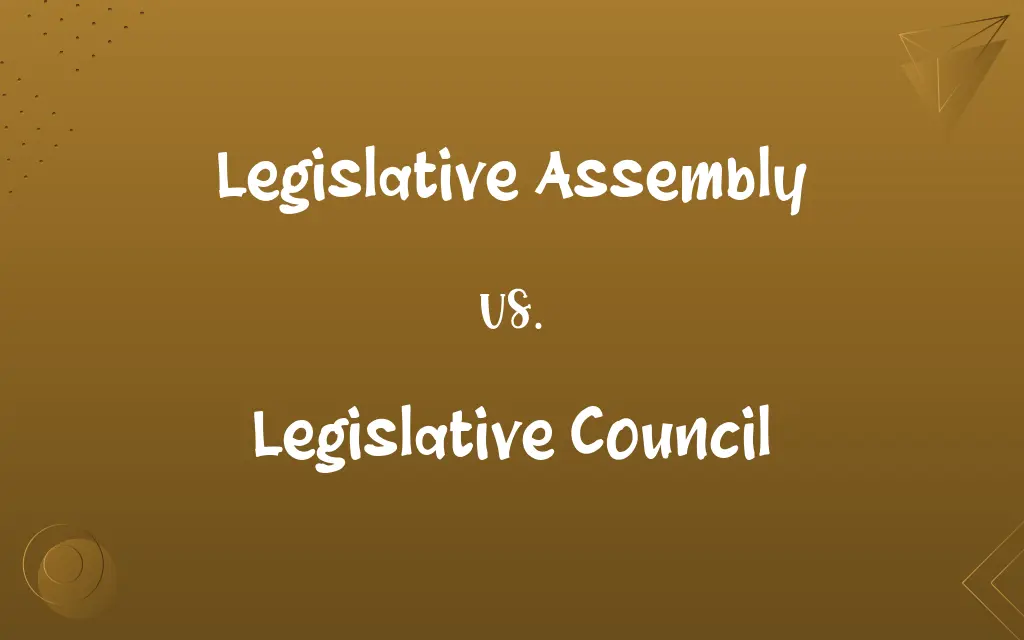Legislative Assembly vs. Legislative Council: Know the Difference

By Hifza Nasir & Shumaila Saeed || Published on June 13, 2024
The Legislative Assembly (Vidhan Sabha) is the lower house in bicameral state legislatures in India, responsible for lawmaking, while Legislative Council (Vidhan Parishad) serves as the upper house, providing reviews and recommendations on legislation.

Key Differences
The Legislative Assembly, or Vidhan Sabha, is a key component of state governance in India, acting as the primary legislative body in unicameral states or the lower house in bicameral ones. It consists of directly elected representatives from various constituencies within the state, with its main functions including lawmaking, passing state budgets, and forming the government. The Legislative Council, or Vidhan Parishad, functions as the upper house in the six states of India that have a bicameral legislature. Instead, they are chosen through a combination of election by assembly members, election by local government bodies, and appointment by the Governor for distinguished individuals in specific fields.
Hifza Nasir
Jun 13, 2024
Vidhan Sabha's members known as Members of the Legislative Assembly (MLAs), serve for a term of five years, unless the assembly is dissolved sooner. Unlike the Vidhan Sabha, members of the Vidhan Parishad are not directly elected by the public. This house serves a dual role of revisory and advisory body, scrutinizing legislation passed by the Vidhan Sabha. Members serve staggered six-year terms, with one-third of the council being renewed every two years, ensuring the council's permanence.
Shumaila Saeed
Jun 13, 2024
The Legislative Assembly has significant power in terms of legislation, budget approval, and government formation, the Legislative Council's role is more consultative, aimed at providing a second review of legislation to ensure thorough scrutiny. The existence of the Legislative Council is meant to act as a check on hasty legislation and to represent the interests of sections of society not directly elected to the Vidhan Sabha.
Shumaila Saeed
Jun 13, 2024
Both houses work together to ensure comprehensive legislative oversight, with the Vidhan Sabha playing a more prominent role in the direct governance and legislative process, and the Vidhan Parishad offering a platform for more deliberative review of laws and policies.
Hifza Nasir
Jun 13, 2024
Comparison Chart
Nature of Election
Directly elected by the electorate
Partially elected, partially nominated
Hifza Nasir
Jun 13, 2024
ADVERTISEMENT
Tenure
5 years, unless dissolved earlier
6 years, with one-third members retiring every two years
Shumaila Saeed
Jun 13, 2024
Powers
Significant in legislation, budget approval, and government formation
Limited to reviewing and suggesting amendments to legislation
Dua Fatima
Jun 13, 2024
Size
Larger, depends on population of the state
Smaller, capped at one-third the size of the Vidhan Sabha
Hifza Nasir
Jun 13, 2024
Composition
Members are MLAs
Members are MLCs (Members of the Legislative Council)
Shumaila Saeed
Jun 13, 2024
ADVERTISEMENT
Financial Authority
Exclusive authority to introduce and pass budget and money bills
Can review but not initiate or amend money bills
Shumaila Saeed
Jun 13, 2024
Government Formation
Has the power to form the government
No direct role in government formation
Dua Fatima
Jun 13, 2024
Representation
Represents the direct will of the electorate
Represents a broader, more diverse interest group including professionals and local government representatives
Hifza Nasir
Jun 13, 2024
Legislative Assembly and Legislative Council Definitions
Legislative Assembly
Responsible for passing the state's budget and laws.
The Rajasthan Legislative Assembly annually approves the state budget.
Hifza Nasir
Feb 27, 2024
Legislative Council
Members (MLCs) are elected by MLAs, local bodies, and appointed by the Governor.
An MLC in Karnataka may be elected by university graduates.
Shumaila Saeed
Feb 27, 2024
ADVERTISEMENT
Legislative Assembly
Can be dissolved before its term ends, triggering elections.
The dissolution of the Telangana Legislative Assembly led to early elections.
Shumaila Saeed
Feb 27, 2024
Legislative Council
Cannot initiate or amend money bills but plays a key role in legislation review.
The Andhra Pradesh Legislative Council discusses and suggests amendments to legislation.
Shumaila Saeed
Feb 27, 2024
Legislative Assembly
Comprises MLAs elected to serve five-year terms.
An MLA from Bengaluru represents his constituency in the Karnataka Legislative Assembly.
Shumaila Saeed
Feb 27, 2024
Legislative Council
Has a permanent nature, with one-third of members retiring every two years.
The Maharashtra Legislative Council ensures continuity in governance.
Shumaila Saeed
Feb 27, 2024
Legislative Assembly
Directly represents the electorate, making laws and forming the government.
The Maharashtra Legislative Assembly plays a key role in governing the state.
Hifza Nasir
Feb 27, 2024
Legislative Council
Represents professionals, educators, and local government bodies.
The Uttar Pradesh Legislative Council includes members representing teachers and local municipalities.
Hifza Nasir
Feb 27, 2024
Legislative Assembly
Holds the majority party responsible for government formation.
The party with the majority in the Uttar Pradesh Legislative Assembly forms the state government.
Hifza Nasir
Feb 27, 2024
Legislative Council
Serves as the upper house, providing reviews and recommendations on legislation.
The Bihar Legislative Council reviews bills passed by the Legislative Assembly.
Hifza Nasir
Feb 27, 2024
Repeatedly Asked Queries
Can the Legislative Council veto legislation passed by the Legislative Assembly?
It cannot veto but can suggest amendments; however, it cannot hold up money bills for more than 14 days.
Hifza Nasir
Jun 13, 2024
Why is the Legislative Assembly considered more powerful than the Legislative Council?
Because it has direct electoral legitimacy, greater legislative powers, and the authority to form the government.
Dua Fatima
Jun 13, 2024
How are members of the Legislative Council chosen?
Through elections by the members of the Legislative Assembly, by local body members, and nominations by the Governor for distinguished persons.
Shumaila Saeed
Jun 13, 2024
Do all states in India have a Legislative Council?
No, only a few states have a bicameral legislature including both a Legislative Assembly and a Legislative Council.
Hifza Nasir
Jun 13, 2024
What role does the Governor play in the Legislative Council?
The Governor has the authority to nominate certain members to the Council based on their expertise in various fields.
Shumaila Saeed
Jun 13, 2024
How does the Legislative Council contribute to state governance?
By providing a platform for deliberative review of legislation and representing specialized interests not covered in the Assembly.
Shumaila Saeed
Jun 13, 2024
What is the purpose of having both a Legislative Assembly and a Legislative Council?
To ensure a comprehensive legislative process, with the Assembly focusing on direct governance and the Council providing a review to prevent hasty legislation.
Shumaila Saeed
Jun 13, 2024
What happens if the Legislative Assembly is dissolved?
Elections are held to reconstitute the Assembly, but the Council remains unaffected due to its staggered terms for members.
Shumaila Saeed
Jun 13, 2024
What is the significance of the staggered terms of Legislative Council members?
To ensure continuity in governance and legislative review, even if the Assembly is dissolved or re-elected.
Hifza Nasir
Jun 13, 2024
Can money bills be introduced in the Legislative Council?
No, money bills can only be introduced in the Legislative Assembly.
Hifza Nasir
Jun 13, 2024
Share this page
Link for your blog / website
HTML
Link to share via messenger
About Author
Written by
Hifza NasirCo-written by
Shumaila SaeedShumaila Saeed, an expert content creator with 6 years of experience, specializes in distilling complex topics into easily digestible comparisons, shining a light on the nuances that both inform and educate readers with clarity and accuracy.






































































